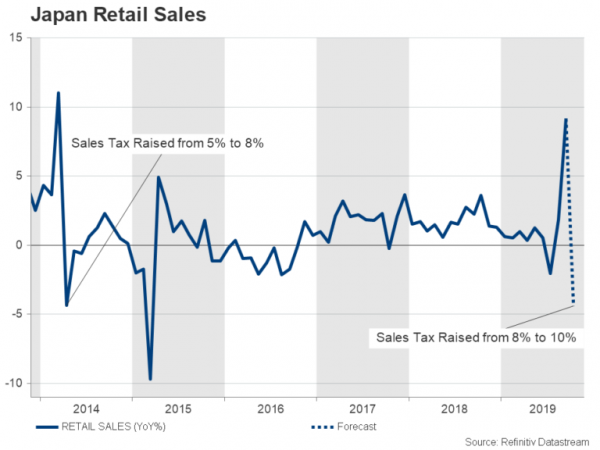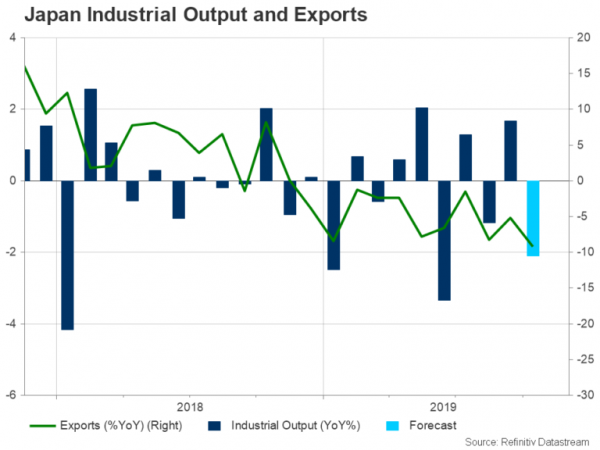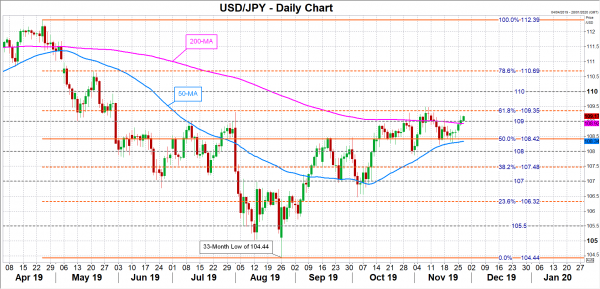Japan raised the national sales tax from 8% to 10% on October 1 – the first increase since 2014 – and early indications are that consumption has taken a hit from the higher prices. This puts the spotlight on the October retail sales numbers that are due out of Japan on Thursday (Wednesday, 23:50 GMT), as a bigger-than-expected fall in spending would pile pressure on the Bank of Japan to increase monetary stimulus.
Big drop expected in retail sales
When Japan last raised its sales tax from 5% to 8% back in April 2014, GDP slumped by 1.9% in that quarter, prompting the Bank of Japan to step up its asset purchases in the subsequent months to prop up the economy. The government has come under criticism for going ahead with the twice-delayed tax increase at a time when Japanese businesses are feeling the pain of the long-running US-China trade dispute that has led to a worldwide slowdown in economic growth.
Analysts are forecasting a 4.4% annual drop in retail sales during October, which would reverse almost half of the 9.1% surge recorded in September when consumers rushed to make purchases ahead of the planned increase. But although the government was better prepared this time, taking several measures to mitigate the impact of the sales tax hike, there are strong indications that retail sales took a big hit in October.
Typhoon added to misery for retailers
Early data supports the gloomy predictions with Japan’s Chain Stores Association saying supermarket sales fell by 4.1% year-on-year in October. Making matters worse, Japan was struck by a typhoon in October, which devastated parts of the country. The bad weather probably exacerbated the pull back in retail spending during the month.
However, when comparing with how consumers reacted in 2014, the latest sales tax hike may not have been as painful. According to one Reuters poll, two-thirds of Japanese companies surveyed thought the impact of the latest rise in the sales tax wasn’t as bad as it was five years ago.
Trade war still weighing on economy
Still, even if the full effect of the latest increase proves to be milder than in 2014, that is not to say that Japan will be able to avoid a contraction in GDP in the fourth quarter. Japan’s vast manufacturing sector is struggling under the weight of the US-China trade war. Exports from the country have been declining year-on-year since December and preliminary industrial output figures out on Friday (Thursday, 23:50 GMT) are expected to show the final quarter of 2019 got off to a poor start.
Industrial production is forecast to have dropped by 2.1% y/y in October, more than undoing the 1.7% rise posted in September.
More BoJ stimulus on the way?
This would leave the door wide open to further stimulus by the Bank of Japan, which this year resisted joining its global peers in easing policy. The BoJ will next meet on December 18-19 to set policy. A worse than expected slump in retail sales and in consumption overall would add pressure on the Bank to act swiftly to fend off a recession.
Speculation of BoJ action is likely to push dollar/yen above the key resistance area of 109.35, comprising of the 61.8% Fibonacci retracement of the April-August downtrend. A break of this barrier would bring into range the 110 handle and the 78.6% Fibonacci at 110.69.
However, if the retail sales numbers are not as terrible as feared and do not point to an economic shock, investors could further trim their expectations of BoJ easing, which has already been scaled back significantly on the back of the renewed trade optimism in recent weeks.
In such a case, dollar/yen would retreat only slightly, possibly towards its 50-day moving average in the 108.35 region, as positive trade sentiment would put a lid on the yen’s advances.
That’s not to say, though, that even if the impact of the sales tax hike isn’t as big as it was in 2014, further easing by the BoJ should be ruled out as that will depend on how the trade war story plays out and how quickly exports bounce back.



